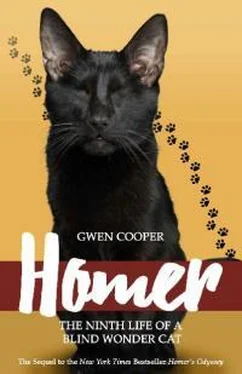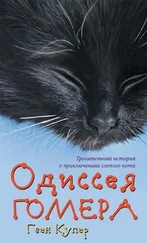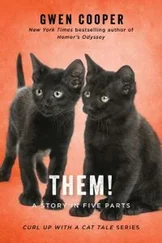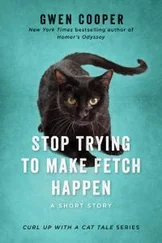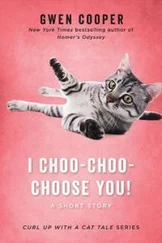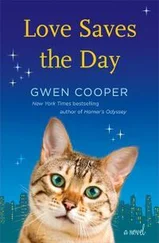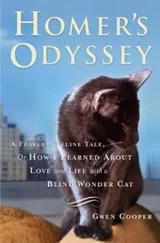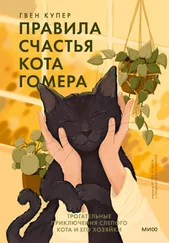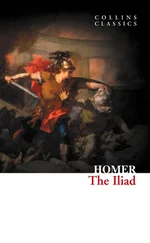Vashti may only have been a supporting player in Homer’s Odyssey. But in our lives—our real lives—she’d always had one of three starring roles. Reading from Homer’s book now, choosing a passage that included Vashti and Scarlett as well as Homer, and having just seen so many other “unadoptable” cats like Homer who’d nevertheless found happiness in loving arms, was the first time I felt truly whole since Vashti had left us.
THERE WAS DECIDEDLY less Homer on Homer’s Facebook page while all this was going on, but those core few who’d been with us from the beginning never complained or abandoned us. And they remained with us still in February of 2011, when Scarlett developed a sarcoma high on her left hind leg, the result of the rabies vaccination she’d gotten years earlier in Miami. (The specific formula that caused this sarcoma in some cats has been discontinued, by the way; you should always vaccinate your cats against rabies.)
In some ways, it was harder with Scarlett as her illness progressed than it had been with Vashti—not because it was so much worse or made her suffer more. But Scarlett had always been such a surly, feisty, irascible girl. She’d been born irritated with everybody and everything—even in her youth, she’d been the mean old lady who yells, Get off my lawn, you kids! Our other cats bothered her. Laurence’s mere existence—his insistence on living with us, despite her having made it perfectly clear that she’d prefer he left—was an ongoing annoyance. Guests in our home had obviously been sent by the devil himself, just so they could coo at her and make other friendly, insulting gestures until she was forced—in a state of high dudgeon—to harrumph her way into the seclusion of a bedroom. There were only two things in the world that Scarlett truly enjoyed—one of them was food, and the other was me. Anybody else, human or feline, was quickly reminded with a sharp rowr! and disciplinary smack of her paw to maintain their distance, leaving her to enjoy her wide berth of personal space in dignified peace.
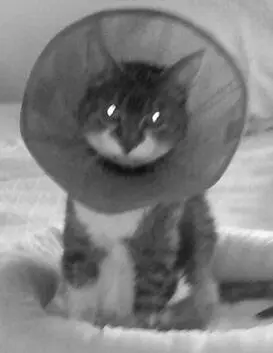
Scarlett mellowed a great deal, however, during those last months—and I’ll admit that it made me sad to see her become more accepting and tolerant as her health failed. I do think, though, that this change was partly because Homer was so considerate of her. He slept nearer to her than he’d ever dared before. But he no longer chased her, no longer tried to insert himself into her games of “chase the paper ball,” no longer bothered her in any way. He stayed closer to Scarlett than he had in earlier years, but his closeness was far less intrusive.
We’d hoped that surgery to remove her tumor would solve the problem—and, when it didn’t, we had difficult decisions to make. There were many in Homer’s community who advocated for removing Scarlett’s leg altogether. But Scarlett was nearly seventeen, and arthritic, and she’d always been so poised and self-possessed that forcing her, at this point in her life, to adjust to getting around on only three legs seemed almost cruel. The same was true of chemotherapy. Others among our online friends had made different decisions for their own cats under similar circumstances. But everybody understood that Scarlett was Scarlett, and that there was no one-size-fits-all solution to these kinds of problems.
Scarlett had become so quiet and tractable by the time we knew it was over, in December of 2011, that it was almost as if she wasn’t there anymore. She was the first cat I’d ever lived with, and there was a special pain in her loss. When I brought her to the vet for the last time, I couldn’t even give my name to the receptionist without bursting into tears.
But Scarlett had one last gift for me. She’d been so silent and immobile in her carrier that I wasn’t even sure she was still awake. But when the doctor very gently inserted the needle into her neck, Scarlett’s eyes—which had been glazed and unfocused for the past day—quickly sharpened and narrowed. I knew by now that a needle so small, injected into the relatively insensitive scruff of her neck, wouldn’t hurt her. But Scarlett still had enough of her personal dignity left to resent that a stranger had dared touch her at all. With her typical churlish rowr! of old, she reached up out of her cloth, blanket-lined carrier to take an annoyed swipe at the vet’s hand. Get off my lawn, you kids!
It was so quintessentially Scarlett that I couldn’t help but chuckle through my tears. There’s my surly girl! For that brief moment, she wasn’t the ailing, compliant Scarlett of the last few months. She was once again the crusty curmudgeon I’d loved so well for so long.
I would always say after that, in describing her final moments, that Scarlett had gotten to die as she’d lived—really, really pissed off.
HOMER TRULY GRIEVED when we lost Scarlett, and Homer’s community grieved with us. After about three days, when it became clear that she wasn’t coming back, Homer seemed to age overnight. His customary run slowed to a walk, and his walk took on the stiff, wide-legged gait of an old man. He was no longer interested in chasing crumpled balls of paper across the living room, or in demanding bits of turkey from Laurence’s sandwiches. Even a fresh sprinkling of home-grown catnip on the rug would leave him apathetic.
It was heartbreaking to see the transformation—made painfully ironic by the certainty I felt that Scarlett herself would have been perfectly content to be the last cat standing. As far as Scarlett was concerned, the best days of her life had been the earliest ones, when she was an only cat.
But Homer had always thought about his relationship with Scarlett very differently than Scarlett did. In Homer’s mind, Scarlett was the (unwitting) supporting player in a thousand stalk-and-pounce adventure tales Homer liked to tell himself. She was his foil, his muse, his great nemesis, and he was never happier than when he’d finally succeeded in irritating her to the point that she would swat at him, nip at his neck, and then chase him down the hall before turning around to let him chase her back into the bedroom. While she hadn’t been especially playful during her last months, she’d still been there —a comforting presence and warm scent, familiar for as long as he could remember, against which Homer could curl up and doze contentedly.
But it wasn’t just the loss of Scarlett herself. Equally hard on Homer, I think, was the fact that he was now alone whenever Laurence and I were out. We had the luxury of spending far more time with Homer than most cat parents could with their own, simply because we worked from our apartment—but, still, we couldn’t be home all the time. A trip to the vet, while unpleasant for all concerned (Homer’s deep-seated hatred of the vet’s office having only grown more intense with time), revealed that—physically, at least—he was in fine health.
What Homer needed more than anything was a new friend.
I thought that an older, more seasoned adult cat might make an ideal companion for Homer. Accordingly, I pulled first one owner-surrendered cat—and, when she and Homer didn’t “click,” another—from the euthanization lists at a New York open-intake shelter. My plan was to foster these cats and, if things worked out, to let them become “foster failures”—permanent members of our family.
There’s always a period of adjustment when two adult cats get to know each other. Even in understanding this, however, things seemed particularly rough between Homer and first one, then the other, of the new cats we tried introducing him to. Poor Homer was utterly incapable of picking up on the visual body language of a wary cat. He had no way of seeing the arched back, the puffed tail, the backward steps of a cat who was unsure if Homer’s approach was friendly or hostile. Scarlett and Vashti had known him since he was a kitten, and had grown accustomed to his seemingly odd ways. But to the cats we brought home now, Homer’s eyeless black face must have appeared completely expressionless. He would approach them for a friendly, how ya doin’? mutual sniff, and was met with nothing but aggressive rebuffs.
Читать дальше
